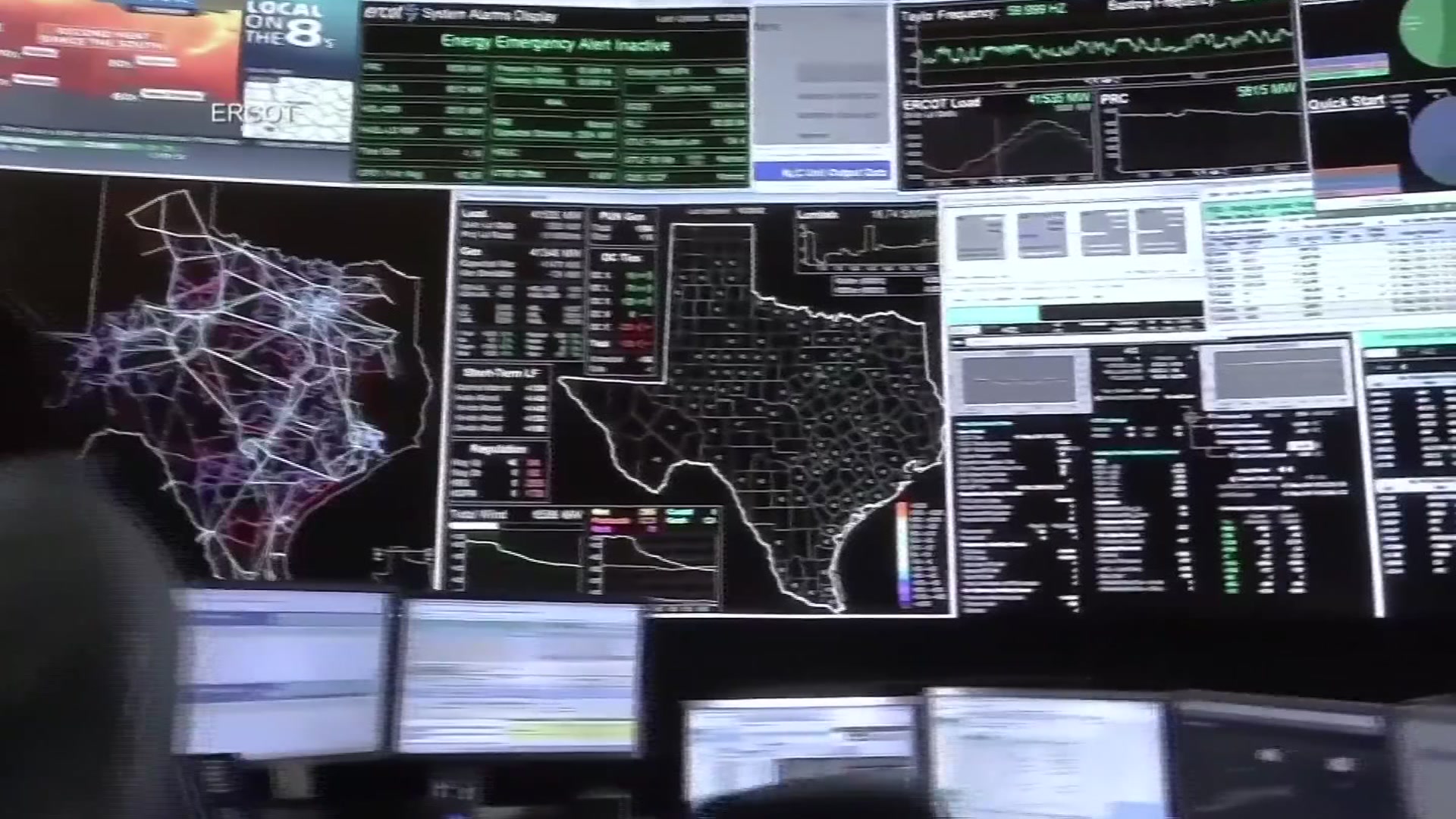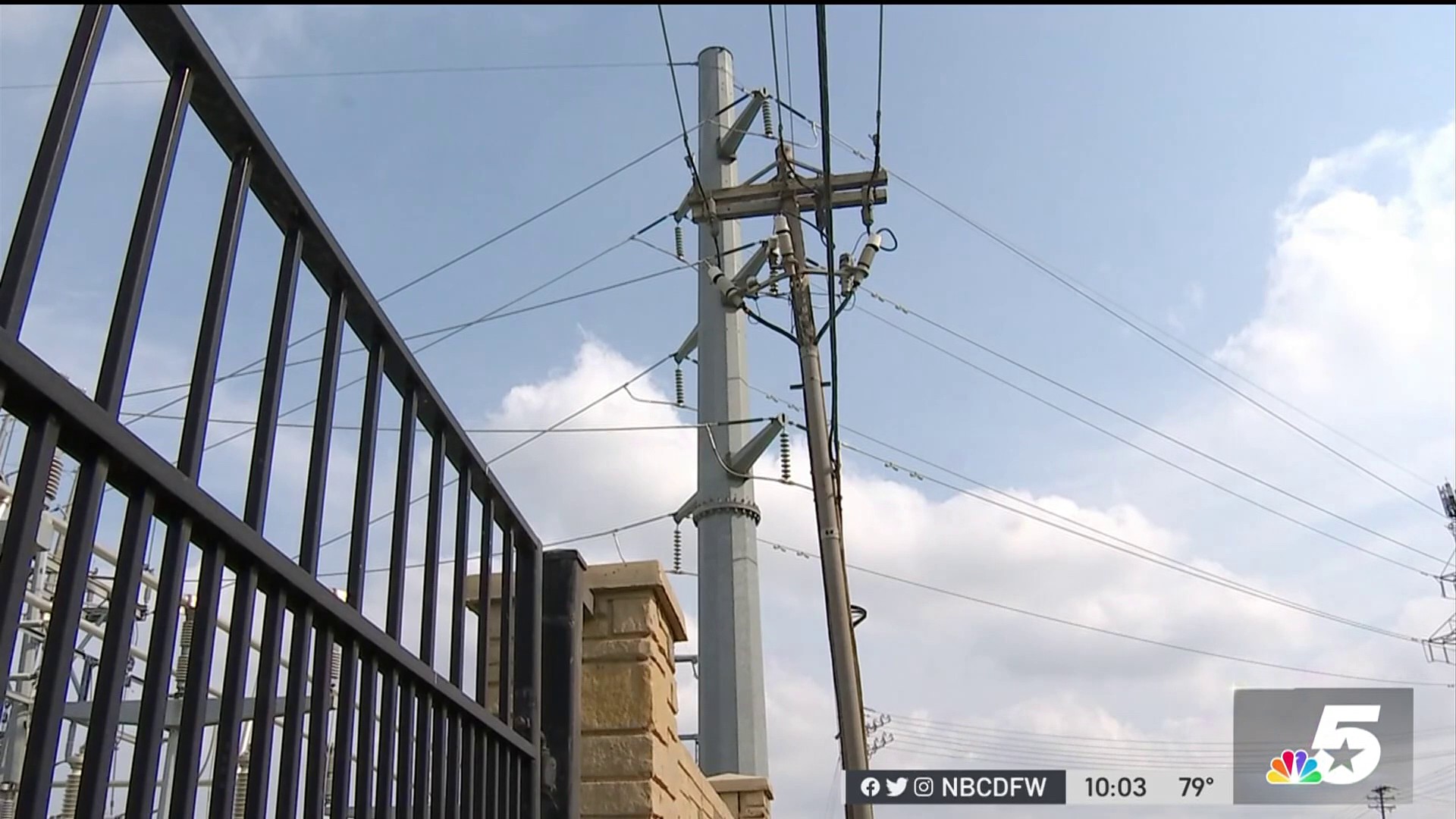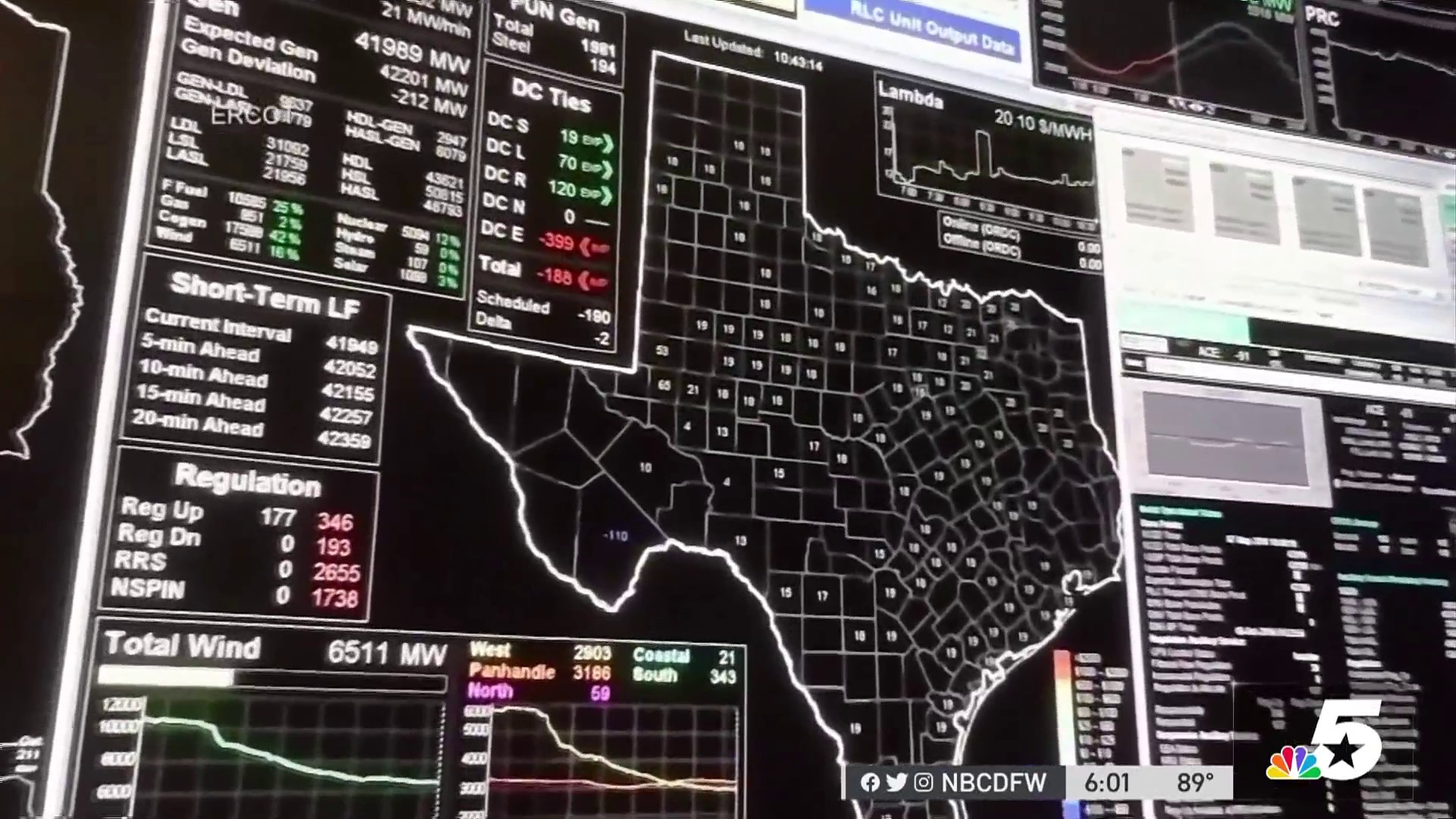While temperatures in North Texas are not expected to be anywhere near what we saw in 2021, the bitter cold, wind, and outages in some areas are enough to remind folks about the importance of being prepared.
On Monday morning, Frisco reported icy road conditions after an irrigation pipe burst along Main Street not far from Toyota Stadium.
In a post on Facebook, the city said, “The section of Main Street, between Dallas Pkwy. & the railroad tracks is slick after an irrigation pipe burst. Crews are sanding, so please use caution. Stay warm and safe everyone!”
CoServ Electric crews had a busy start to the week after thousands of customers in areas including Collin County were left without electricity.
Get top local stories in DFW delivered to you every morning. >Sign up for NBC DFW's News Headlines newsletter.
In a separate post on Facebook, the city said, “POWER OUTAGE - CoServ is reporting power outages impacting about 1,400 customers within an area bordered by Main St., Legacy Dr., Stonebrook Pkwy., and FM423. CoServ shares restoration is expected around 9 a.m. this morning. Thank you for your patience.”
Just before 10 a.m. On Monday, the city said the number of affected customers dropped to 150.
“A revised, restoration timeline for those customers is now 10:30 a.m. Thank you for your continued patience. Stay safe everyone,” the City of Frisco said on Facebook.
In Tarrant County, ERCOT reported 283 customers affected and 888,103 customers served during outages as the cold air mass settled over the area.
Susan Shaw visited her local hardware store to help winterize her mother’s home in Hurst.
“My mother is 88,” Shaw said. “So, I went by her house to check on her that she had her faucets covered, and she did not. So, I ran down to the store to grab them for her.”
Shaw purchased four faucet covers at less than $5 each.
“Even if it's a false alarm, it’s a few bucks to save, literally thousands, tens of thousands of dollars,” Shaw said. “I also have an insurance agency, and I handle it from the other side all the time.”
Steve Quintanilla is the assistant manager at Jabo's Ace Hardware in Hurst. He said customers poured in over the weekend.
“We sold probably about 30 boxes of faucet covers,” Quintanilla said.
Quintanilla said there is still time to prepare as morning hard freezes are expected all week, and winter precipitation is likely by the end of the week.
“We've been selling a few gloves. Some de-icer and fire logs have been selling propane. We've been filling a lot of propane bottles as well,” Quintanilla said, adding that carbon monoxide detectors and smoke alarms are also an item customers should consider.
“A lot of times people start they put their heaters on or they'll slide their stoves. They don't realize that there's gases coming out of that. And if something stops, you're getting gas inside your house, and you could potentially die from it. I mean, it's so important to have that sort of stuff to protect yourself and your house,” Quintanilla said.
Quintanilla also recommends that people seal any cracks around windows.
In addition to faucet covers, Quintanilla said there is a colorful item customers have consistently inquired about.
“Today we've had we've probably sold about 10 sleds. People have been buying our sleds already,” Quintanilla said. “They're getting ready for Thursday snow or Friday snow. But we've been selling sleds like crazy today.”
“I just came to get a sled,” Ryan Maozac said. “I want to take my son sledding.”
North Texas could begin to see a winter mix as early as Thursday morning, with a possible transition to snow during the day on Thursday.
WEATHER
COLD WEATHER PREPARATION

Winterizing Your Home
Before the cold, replace worn weatherstripping on doors and windows to ensure a good seal. This will make sure warm air stays inside and cold air stays outside. Most modern windows are sealed inside the frame, but older windows may be sealed with a glaze that can crack and need replacing. The glaze may need to be applied above a certain temperature and it'll need time to cure -- this maintenance is ideally done in the spring or fall. Lastly, check your gutters to ensure they are clear and allow water to flow freely to the downspout. Blocked gutters can lead to water entering the home. The Texas Department of Insurance also recommends trimming trees away from power lines, homes, and cars and checking the insulation level in attics.
Protecting Your Pipes
Most North Texans know to insulate their outdoor faucets, but if the cold snap is prolonged it could be a good idea to also leave inside faucets on external walls dripping overnight so that they don't freeze. The drip, drip, drip from running faucets, if heard, can be annoying, so put a sponge or towel in the sink to silently catch each drop. If you're leaving town for a few days, the Texas Department of Insurance recommends leaving cabinet doors open so that pipes on external walls are more exposed to heat. If you have pipes in an attic or crawlspace or any other exposed pipes outdoors, they'll need insulation, too. For external faucets, disconnect hoses and insulate the valves. Wrapping valves with towels is not the best long-term solution. Most, if not all, North Texas hardware stores sell inexpensive exterior faucet covers made of foam that easily attach to the faucet bib in just a few seconds and do a great job protecting the pipe from freezing. If you suspect a pipe has frozen, keep the faucet open so that water can flow when it melts. Additionally, make sure you know where your main water valve is located (and how to turn it off) in the event a pipe bursts.

Bring in Your Pets
Even if you have a pet or animal that normally lives or sleeps outdoors, they could be susceptible to cold, hypothermia, and pneumonia. The SPCA of Texas says if you're cold outside, odds are your pet is cold too. Bring pets inside and make sure other outdoor animals have appropriate shelter, dry and well insulated, to protect them from frigid temperatures and possible death.
Protecting Your Plants
Perennial potted plants should be brought indoors. Plants that cannot be brought inside will need to be covered. Delicate plants can be covered with sheets, blankets, or landscaping frost blankets, which can trap heat. During times of extreme cold, multiple frost blankets may be used. For plants left outside a day or two before a freeze hits, the Dallas Arboretum recommends watering the soil only by hand, keeping the foliage dry to insulate the plant's roots. The Texas A&M AgriLife Extension has more here on how to protect plants from frosts and freezes. AgriLife also has tips on how to plant for the winter.

Turn Off Your Sprinkler System
You want to turn off your irrigation system for several reasons. One is that you don't want it running on its normal schedule, potentially throwing water on streets where it can freeze and be dangerous for passing cars. Second, you don't want to risk any broken pipes or valves that may come with a system that has not been winterized. To winterize your system, the city of Fort Worth recommends that timers and back-flow devices both be turned off, even if you have freeze or rain sensors installed and that the main line be drained. Any pipes that are above the ground should also be insulated.
HVAC
Many air filters should be changed or cleaned every three months or every season. But that's not the only winterizing needed for your HVAC system. You should check your ductwork regularly for holes (whether from vibration or rodents) to ensure the airflow is uninterrupted. If part of your HVAC is in the attic, it may also be home to rats, mice, and squirrels who find the unit's warmth an ideal spot to build a nest.
Swimming Pools
Even if you have a freeze protector among your pool equipment, you'll want to look at the pump daily to ensure it's moving water through your pipes. Those pipes, too, can burst if they freeze.
Batteries
Having fresh batteries for flashlights during a power outage is always a good idea. If you didn't replace the batteries in your smoke and carbon monoxide detectors during daylight saving time -- now is a good time to make the switch. It's also a good idea to ensure your phone is charged so that you'll have access to timely information in the event of a power loss. Having a backup battery or power source to recharge your phone is also a good idea.
ERCOT TXANS and Emergency Levels Explained
In 2023, ERCOT debuted TXANS to deliver clear and reliable information to the public about grid conditions. Here’s what the alert levels mean:
- Weather Watch: A Weather Watch is an advanced notification of an upcoming weather system that is expected to increase electricity usage. Texans are asked to pay attention to changing weather conditions that may result in a call for conservation. During a Weather Watch, grid conditions and electricity use are normal.
- Conservation Alert: This is a voluntary request to reduce electrical use, ERCOT said. While ERCOT said it is not in emergency operations, it asks the public and “all government agencies to implement all programs to reduce energy use at their facilities.”
- Energy Emergency Level 1: Conservation is considered to be critical. We reach this stage when operating reserves drop below 2,300 MW and are not expected to recover within 30 minutes.
- Emergency Level 2: Triggered when reserves are less than 1,750 MW and are not expected to recover within 30 minutes. At this point, ERCOT can reduce demand on the system by interrupting power from large industrial customers who have contractually agreed to have their electricity turned off during an emergency.
- Emergency Level 3: The final level hits when reserves drop below 1,430 MW. If operating reserves then drop below 1,000 MW and are not expected to recover within 30 minutes and/or the grid’s frequency level cannot be maintained at 60 Hz, then ERCOT will implement “controlled outages,” also known as rolling blackouts.





